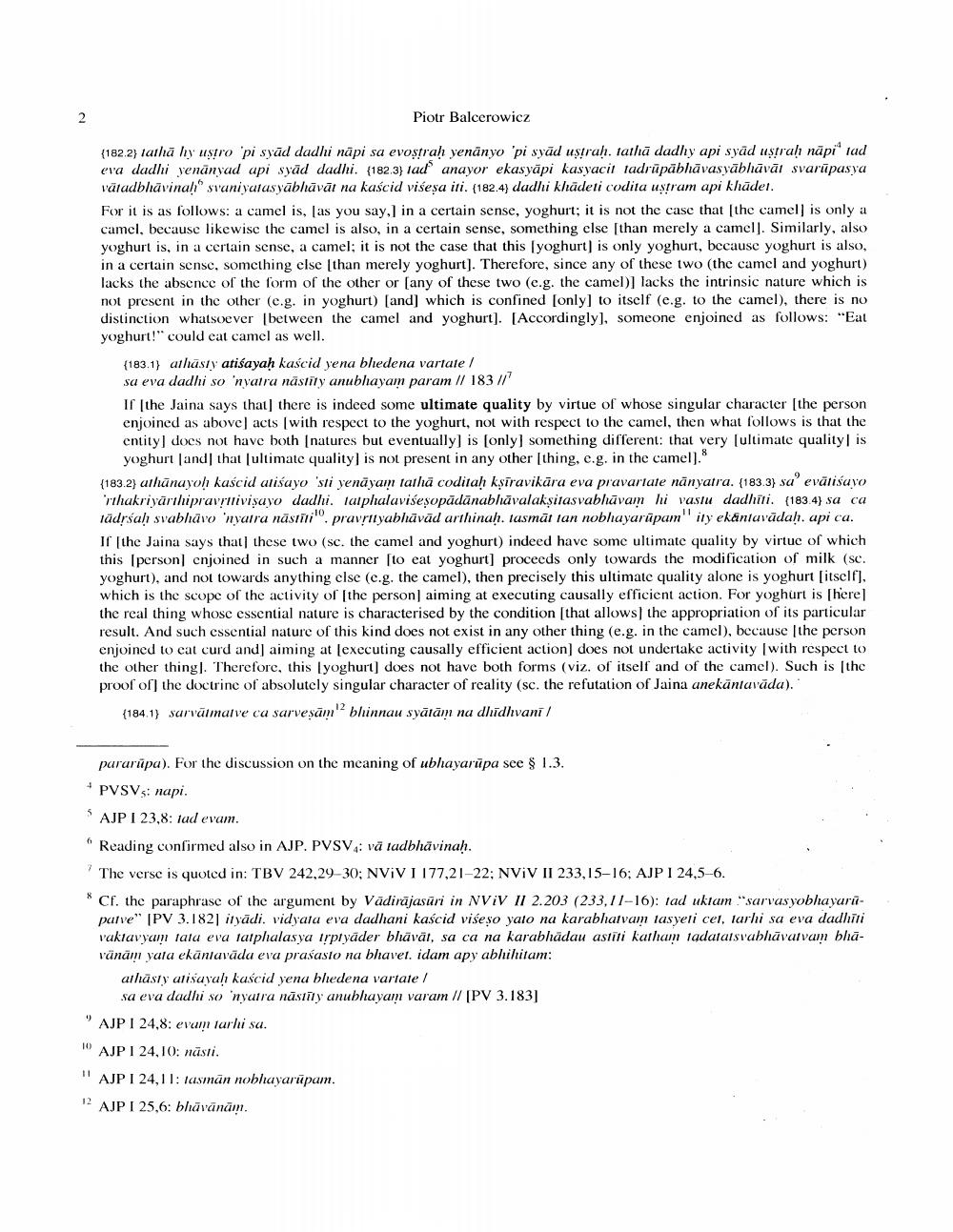Book Title: Dharmakirtis Criticism Of Jaina Doctrine Of Multiplexity Of Reality Anekantavada Author(s): Piotr Balcerowicz Publisher: Piotr Balcerowicz View full book textPage 2
________________ Piotr Balcerowicz (182.2) tathā hy ustro 'pi syād dadhi näpi sa evostrah yenānyo 'pi syād ustrah. tathā dadhy api syâd ustrah nāpi tad eva dadhi yenānyad api syöd dadhi. (182.3) iad anayor ekasyāpi kasyacil tadrūpābhāvas yābhāvāt svarūpasya vātadbhāvinah svuniyalasyābhāvāt na kaścid višesa iti. (182.4) dadhi khädeti codita ustram api khādet. For it is as follows: a camel is, as you say,] in a certain sense, yoghurt; it is not the case that the camell is only a camel, because likewise the camel is also, in a certain sense, something else [than merely a camel). Similarly, also yoghurt is, in a certain sense, a camel; it is not the case that this (yoghurt) is only yoghurt, because yoghurt is also, in a certain sense, something else (than merely yoghurt). Therefore, since any of these two (the camel and yoghurt) lacks the absence of the form of the other or (any of these two (e.g. the camel)] lacks the intrinsic nature which is not present in the other (e.g. in yoghurt) (and) which is confined [only] to itself (e.g. to the camel), there is no distinction whatsoever between the camel and yoghurt). [Accordingly, someone enjoined as follows: "Eat yoghurt!" could eat camel as well. (183.1) athasty atiśayah kaścid yena bhedena vartale/ sa eva dadhi so 'nyalra nästīty anubhayam param // 183 //' If the Jaina says that there is indeed some ultimate quality by virtue of whose singular character [the person enjoined as above) acts with respect to the yoghurt, not with respect to the camel, then what follows is that the entity] does not have both natures but eventually) is (only something different: that very lultimate quality is yoghurt and that ultimate quality is not present in any other thing, c.g. in the camel). {183.2} athānayoh kaścid aliśayo 'sti yenäyam tathā coditah kşīravikāra eva pravarlate nânyatra. (183.3) sa' evālisavo 'rthakriyârihipravritivisayo dadhi. taiphalaviseşopūdānabhāvalakṣitasvabhāvam hi vastu dadhiti. (183.4} sa ca tādrsah svabhāvo nyara nāstīti" pravrilyabhāvād arthinah. tasmāt tan nobhayarūpamily ekantavādah. api ca. If the Jaina says that these two (sc. the camel and yoghurt) indeed have some ultimate quality by virtue of which this person enjoined in such a manner [to eat yoghurt) proceeds only towards the modification of milk (sc. yoghurt), and not towards anything else (c.g. the camel), then precisely this ultimate quality alone is yoghurt (itself), which is the scope of the activity of the person) aiming at executing causally efficient action. For yoghurt is [here the real thing whose essential nature is characterised by the condition that allows the appropriation of its particular result. And such essential nature of this kind does not exist in any other thing (e.g. in the camel), because the person enjoined to eat curd and) aiming at (executing causally efficient action does not undertake activity with respect to the other thingl. Therefore, this lyoghurt) does not have both forms (viz. of itself and of the camel). Such is the proof of the doctrine of absolutely singular character of reality (sc. the refutation of Jaina anekāntavāda). (184.1) sarvärmalve ca sarveșām bhinnau syātām na dhidhvani/ pararüpa). For the discussion on the meaning of ubhayarüpa see $ 1.3. + PVSVs: napi. $ AJPI 23,8: ad evam. Reading confirmed also in AJP. PVSV : vä tadbhävinah. The verse is quoted in: TBV 242,29-30; NViV I 177,21-22; NViV II 233,15-16; AJP 1 24,5-6. * Cf. the paraphrase of the argument by Vädirājasūri in NViV II 2.203 (233,11-16): tad uktam "sarvasyobhayari palve" (PV 3.182) ityādi. vidyata eva dadhani kaścid viseso yato na karabhatvam tasyeli cel, tarhi sa eva dadlīti vaktavyam tata eva tatphalasya trplyāder bhāvāt, sa ca na karabhādau astīti katham tadatatsvabhāvaivam bhāvänäm yala ekāntavāda eva prašasto na bhavel, idam apy abhihitam: arhāsty alisavah kaścid yenu bledena vartale / sa eva dadhi so 'nyatra nāstīty anubhayam varam // [PV 3.183] AJP I 24.8: evam larhi sa. 10 AJP I 24.10: năsti. " AJP I 24,11: Tasmān noblayarūpam. 12 AJP I 25.6: bhāvānām.Page Navigation
1 2 3 4 5 6 7 8 9 10 11 12 13 14 15 16 17 18 19 20 21 22 ... 30
